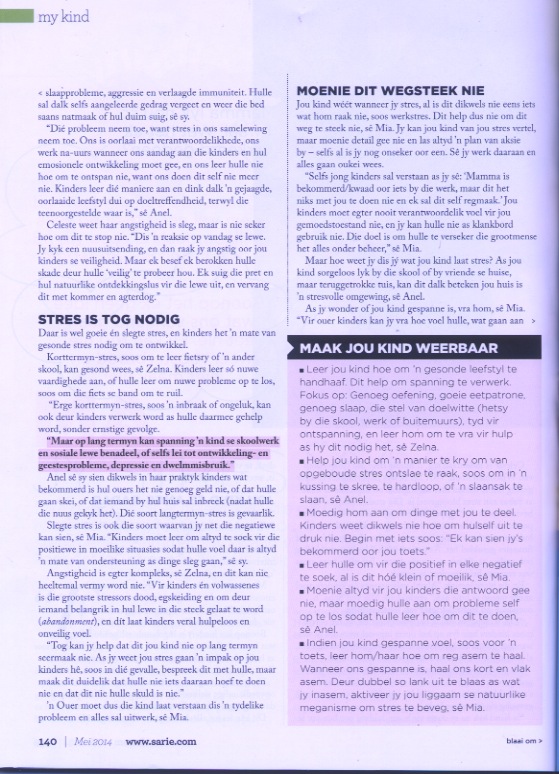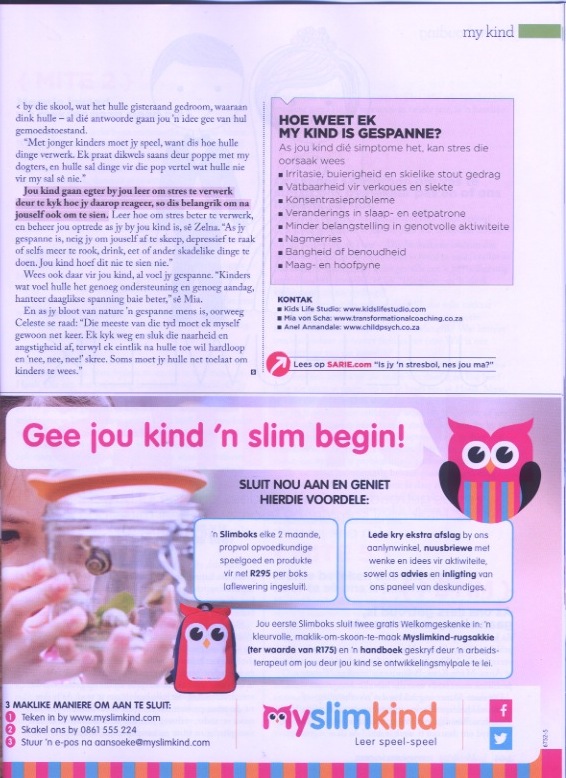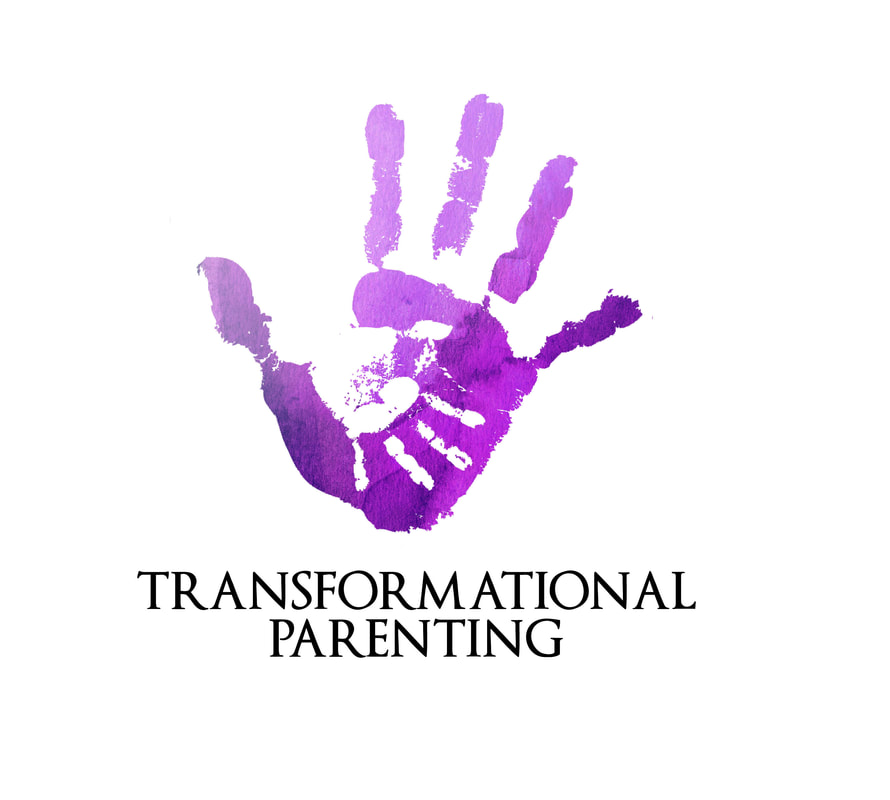
Mia Von Scha chats to Delia du Toit of Sarie Magazine about how parents' stress can affect their children and what to do about it.
For those of you who don't speak Afrikaans, here is the gist of the article in English - with Delia's questions and my responses:
-Are children affected by their parents’ mood or state of mind? How so?
Yes, definitely. Children, particularly at the pre-school age, experience the world emotionally and energetically and are therefore very sensitive to the moods of people around them. All of us experience this sometimes, where we walk into a room and can sense that there has been a fight there, or when we see our partner as walking around in a "black cloud". We just tend, as adults, to be more self-absorbed, and more distracted by our own lives and thoughts to always be aware of this. But we are all affected by the moods of the people around us all the time. Children just tend to notice it more, and be more affected by it as their worlds are much smaller (and usually the home environment is a huge part of this). Children also look to the adults in their lives for cues as to what is ok or not ok, how to behave and feel, and so a parent in a negative state gives a strong message to the child that everything is not ok at the moment.
-Why would a child feel anxious when a parent is stressed? Is it a case of absorbing the mood, or would the child perhaps think it’s their fault?
It can be either or a bit of both, depending on the child and the circumstances. If we look at it in an evolutionary sense, we are wired to look to our parents (or primary caregivers) for cues as to what is going on and how to behave for survival. If we were living in the bush, we'd need to be sensitive to a parent becoming stressed, as this would indicate potential danger and a need for different behaviour in order to survive. We're still wired for this, and children, provided they are still parent-oriented, will look to the parents to help them process the world. If a parent is stressed, the child will unconsciously take this as a sign of potential danger or threat and is more likely to become anxious themselves. This is particularly the case with kids as they are often not included in discussions of what is really going on and therefore don't have the information and reassurance that this has nothing to do with them, or that it is a temporary thing, and that things are going to work out fine etc. Children are also prone to thinking things are their fault as they are very ego-centric and tend to think that everything is about them. The more sensitive the child, the more likely they are to think that they may be the source of the stress.
-How would a child pick up on stress? Would the parent perhaps become snappish or strict, or is it picked up from their body language and attitude?
We all pick up on subtle cues from other people as to how they are feeling – slight changes in body language, facial tension, even your sweat smells differently if it is sweat from stress rather than sweat from exercise. We may not be consciously aware of all the millions of bits of information that our unconscious minds are picking up on, but what we do get is the end feeling that something is not ok. Parents definitely can become more snappish and strict when stressed, but most children will have picked up on the stress long before you're displaying obvious outward signs of it.
-Is the problem becoming worse in our stressed society these days? Or has it always been this way?
Stress has always been around - it really is a matter of perspective rather than actual circumstance, however I do think that the perspective of most parents those days is that they are under a lot more pressure, particularly with the majority of households needing both parents to work full time, and with the constant demand on our attention from the advances in technology – we're "expected" to be in constant contact via email, sms etc and I think most parents are taking a lot less down–time than they used to. Children, too, tend to be more stressed, as they are pushed to excel, to "make it" in the fast paced world and are pushed into more extra-murals and excessive amounts of homework, and also because they tend to get less one-on-one time with their parents, something which is essential to their emotional well-being.
-Is it unrealistic to expect to be able to protect your child from all stress? What type of stress is okay and what isn’t?
Here I think we need to make a distinction between eustress and distress. Eustress, literally meaning "good stress", is where we feel positively challenged. We need some challenge in our lives to keep us growing and learning and to stay motivated and excited by life. Distress, on the other hand, is what most of us refer to when we speak of stress, and is the "bad stress", where we feel we have too much challenge and not enough support and that we are sinking. Again, the distinction between the two is mostly a matter of perspective. In life we are always going to have both challenge and support, and if we focus purely on the challenges and don't look for the support (i.e. Looking at the negatives without seeing the positives) we will tend to feel overwhelmed and unable to cope. But there are always both, and if you can train yourself, and your children, to see the upsides whenever there is a down, then all stress becomes eustress and an opportunity for growth.
-When is it okay to start talking to them about your stressors, and how should you handle it? When/in which cases should you never do so?
If you consider that your children already know that you are stressed, I think that it is important to always speak to them about it, no matter what their age. However, this needs to be done in a positive, reassuring way, and you need to explain that you are dealing with it (and even telling them how you are dealing with it can be a useful life lesson). The way that you speak obviously needs to be appropriate for their age and level of maturity, but even a very young child can be told that mommy is feeling upset or angry or worried about something at work or with another family member for example, and it has nothing to do with you, and mommy is sorting it out. Particularly if you have lost your temper or snapped at your child, it helps to apologise and explain that you are in a bad mood and you cracked and it had nothing to do with them. I find that this is a valuable lesson for children – they are also going to become stressed at some point in their lives and will lose it with someone else, and if they have seen you model this behaviour of apologising and explaining, they will firstly feel that they are a normal human being for losing it (and not some abnormal delinquent) and that there is a way to make it better.
The important thing when speaking to your children about your stressors is to not turn them into your therapist. Children should NEVER feel responsible for your state of mind. Your purpose in discussing the stressor with them is to put their minds at rest that everything is being handled by the adults. NOT to use them as a sounding board for your problems.
-How can a parent pick up that a child is stressed? (please list at least 5 symptoms/behavioural clues)
Children often find it difficult to express in words that they are feeling stressed, and so this will most likely come out physically or in their behaviour.
Crying, complaining more than usual, overly fearful
Nightmares, bedwetting, sleep changes (sleeping less or more than usual)
Changes in behaviour – sudden naughtiness, aggression, emotional outbursts or being overly well-behaved
Suddenly becoming clingy or withdrawing
Physical symptoms such as headaches, stomach aches, tiredness
Difficulty concentrating
-Would this child then become an anxious adult?
I wouldn't say that a period of stress in a child's life is likely to make them an anxious adult. A much more likely indicator of whether a child will grow up to be anxious would be how the parents handle stress. If parents model for and teach the children positive ways of handling stress and anxiety and keep an open channel of communication with their kids, these children will be much more likely to handle the inevitable challenges of life in a positive way. Parents who do not handle their stress well, who are more secretive and erratic in their behaviour are more likely to pass on the message to the children that life is stressful and there is no escape. As I said before, stress is about your perception of events – there is no event or circumstance in life that is inherently stressful – stress is about the meaning that we apply to the situation and to ourselves – it is the internal dialogue that we have about what is going on and out ability to handle it. And this is learned. We learn patterns in the way that we think about the world from our parents. When we, as parents, learn positive ways to deal with life and challenges we tend to naturally pass those on to our children through our behaviour, our state and what we say.
-And how would you know if it’s because of you or other reasons?
This all comes down to communication and presence. If you spend enough one-on-one quality time with your children they will tell you what is going on in their lives – either directly or indirectly through play. With older children it is worth just asking them what is going on – how are they feeling, what is happening at school, ask them about their dreams in the morning (which often reveal a lot about what is worrying them) etc. With younger kids, get down on the floor with them and play. Children reveal so much about their lives and thoughts in their games, and if you are even vaguely attentive you will easily pick up on what is going on and what they are stressed about – they process their worlds through play. With my girls I like to chat to them at bedtime with a puppet – so the puppet has a talk to them about their day and what's going on in their lives, and they will often tell the puppet things that they wouldn't think to tell you!
-How can you help a stressed child?
Start by helping yourself – if you have no idea how to handle stress you are not going to be able to pass on positive messages to your kids – they will always learn more from how you live your life than anything you say to them.
Use any of the tips below – in the next question.
Be present with your kids. Make sure that every day you have some one-on-one time with them where you are fully present (switch off your phone and computer, close the door, get onto their level). Children who feel that the adults in their lives are there for them 100% have more resilience and are better able to cope with challenges. If they feel that they can talk to you and that you are actually listening they can get things off their chests and get some adult input into how to handle difficult situations. Also many parents miss the fact that their kids are stressed or being bullied etc because they are simply too busy, too stressed and too preoccupied with their own stuff to really hear what their kids are saying to them or to notice the first subtle changes in behaviour that indicate that something is wrong. Slow down. Really be there for your children. Your very presence and attention can help them to feel that everything is going to be ok.
-How can you prepare your child to deal with stress in general (for life outside the home)? (at least 5 tips please)
1. Teach them how to breathe properly. When we are stressed we tend to have very quick, shallow breaths. Taking long, deep, breaths (where the out breath is twice as long as the in breath) activates the parasympathetic nervous system (the one that tells our bodies that we are relaxed and safe) and is such a simple tool for handling stress that can be used anytime anywhere.
2. Teach them to look for the positives in the negatives. If you can find the upside to what looks like an only bad situation you can learn to turn any challenge into eustress rather than distress. No matter how bad the situation seems to be there is always an upside if you really look for it.
3. Teach them relaxation or meditation techniques. Numerous studies have shown the benefits of regular meditation in dealing with stress and anxiety. This does not need to interfere with anyone's religious beliefs – it can be as simple as lying down and tensing and then relaxing each group of muscles in the body, or imagining yourself inside a coloured bubble of light where you are completely safe and protected. There are so many wonderful, simple techniques that you can find with a quick Google search.
4. If they are anxious about something coming up (exams, a new school, moving etc) you can teach them to close their eyes for a minute and to imagine themselves flying out above their lives into the future – to after the successful completion of whatever it is they are anxious about. It's a great trick for getting the mind to focus on a positive outcome rather than always focusing on the potential negatives.
Make sure they are involved in some form of fun, regular, non-competitive exercise. Exercise is an incredible way of dealing with stress (unless it becomes a source of stress because it is not something you enjoy or is highly competitive). Find something that your child LOVES doing – this doesn't need to be a formal exercise – it could be skateboarding, dancing, swimming, riding their bikes, etc.
Most importantly, learn to deal with stress yourself. You cannot teach a child to deal with stress if you cannot do this yourself. Your example is what they will end up imitating, and if you have really poor coping skills the chances are that they will too. Find out how to deal with stress and implement your findings. If you are not coping on your own, find a good coach or therapist who can help you to get on top of your stress so that you don't pass these negative patterns on to your children.
-Are children affected by their parents’ mood or state of mind? How so?
Yes, definitely. Children, particularly at the pre-school age, experience the world emotionally and energetically and are therefore very sensitive to the moods of people around them. All of us experience this sometimes, where we walk into a room and can sense that there has been a fight there, or when we see our partner as walking around in a "black cloud". We just tend, as adults, to be more self-absorbed, and more distracted by our own lives and thoughts to always be aware of this. But we are all affected by the moods of the people around us all the time. Children just tend to notice it more, and be more affected by it as their worlds are much smaller (and usually the home environment is a huge part of this). Children also look to the adults in their lives for cues as to what is ok or not ok, how to behave and feel, and so a parent in a negative state gives a strong message to the child that everything is not ok at the moment.
-Why would a child feel anxious when a parent is stressed? Is it a case of absorbing the mood, or would the child perhaps think it’s their fault?
It can be either or a bit of both, depending on the child and the circumstances. If we look at it in an evolutionary sense, we are wired to look to our parents (or primary caregivers) for cues as to what is going on and how to behave for survival. If we were living in the bush, we'd need to be sensitive to a parent becoming stressed, as this would indicate potential danger and a need for different behaviour in order to survive. We're still wired for this, and children, provided they are still parent-oriented, will look to the parents to help them process the world. If a parent is stressed, the child will unconsciously take this as a sign of potential danger or threat and is more likely to become anxious themselves. This is particularly the case with kids as they are often not included in discussions of what is really going on and therefore don't have the information and reassurance that this has nothing to do with them, or that it is a temporary thing, and that things are going to work out fine etc. Children are also prone to thinking things are their fault as they are very ego-centric and tend to think that everything is about them. The more sensitive the child, the more likely they are to think that they may be the source of the stress.
-How would a child pick up on stress? Would the parent perhaps become snappish or strict, or is it picked up from their body language and attitude?
We all pick up on subtle cues from other people as to how they are feeling – slight changes in body language, facial tension, even your sweat smells differently if it is sweat from stress rather than sweat from exercise. We may not be consciously aware of all the millions of bits of information that our unconscious minds are picking up on, but what we do get is the end feeling that something is not ok. Parents definitely can become more snappish and strict when stressed, but most children will have picked up on the stress long before you're displaying obvious outward signs of it.
-Is the problem becoming worse in our stressed society these days? Or has it always been this way?
Stress has always been around - it really is a matter of perspective rather than actual circumstance, however I do think that the perspective of most parents those days is that they are under a lot more pressure, particularly with the majority of households needing both parents to work full time, and with the constant demand on our attention from the advances in technology – we're "expected" to be in constant contact via email, sms etc and I think most parents are taking a lot less down–time than they used to. Children, too, tend to be more stressed, as they are pushed to excel, to "make it" in the fast paced world and are pushed into more extra-murals and excessive amounts of homework, and also because they tend to get less one-on-one time with their parents, something which is essential to their emotional well-being.
-Is it unrealistic to expect to be able to protect your child from all stress? What type of stress is okay and what isn’t?
Here I think we need to make a distinction between eustress and distress. Eustress, literally meaning "good stress", is where we feel positively challenged. We need some challenge in our lives to keep us growing and learning and to stay motivated and excited by life. Distress, on the other hand, is what most of us refer to when we speak of stress, and is the "bad stress", where we feel we have too much challenge and not enough support and that we are sinking. Again, the distinction between the two is mostly a matter of perspective. In life we are always going to have both challenge and support, and if we focus purely on the challenges and don't look for the support (i.e. Looking at the negatives without seeing the positives) we will tend to feel overwhelmed and unable to cope. But there are always both, and if you can train yourself, and your children, to see the upsides whenever there is a down, then all stress becomes eustress and an opportunity for growth.
-When is it okay to start talking to them about your stressors, and how should you handle it? When/in which cases should you never do so?
If you consider that your children already know that you are stressed, I think that it is important to always speak to them about it, no matter what their age. However, this needs to be done in a positive, reassuring way, and you need to explain that you are dealing with it (and even telling them how you are dealing with it can be a useful life lesson). The way that you speak obviously needs to be appropriate for their age and level of maturity, but even a very young child can be told that mommy is feeling upset or angry or worried about something at work or with another family member for example, and it has nothing to do with you, and mommy is sorting it out. Particularly if you have lost your temper or snapped at your child, it helps to apologise and explain that you are in a bad mood and you cracked and it had nothing to do with them. I find that this is a valuable lesson for children – they are also going to become stressed at some point in their lives and will lose it with someone else, and if they have seen you model this behaviour of apologising and explaining, they will firstly feel that they are a normal human being for losing it (and not some abnormal delinquent) and that there is a way to make it better.
The important thing when speaking to your children about your stressors is to not turn them into your therapist. Children should NEVER feel responsible for your state of mind. Your purpose in discussing the stressor with them is to put their minds at rest that everything is being handled by the adults. NOT to use them as a sounding board for your problems.
-How can a parent pick up that a child is stressed? (please list at least 5 symptoms/behavioural clues)
Children often find it difficult to express in words that they are feeling stressed, and so this will most likely come out physically or in their behaviour.
Crying, complaining more than usual, overly fearful
Nightmares, bedwetting, sleep changes (sleeping less or more than usual)
Changes in behaviour – sudden naughtiness, aggression, emotional outbursts or being overly well-behaved
Suddenly becoming clingy or withdrawing
Physical symptoms such as headaches, stomach aches, tiredness
Difficulty concentrating
-Would this child then become an anxious adult?
I wouldn't say that a period of stress in a child's life is likely to make them an anxious adult. A much more likely indicator of whether a child will grow up to be anxious would be how the parents handle stress. If parents model for and teach the children positive ways of handling stress and anxiety and keep an open channel of communication with their kids, these children will be much more likely to handle the inevitable challenges of life in a positive way. Parents who do not handle their stress well, who are more secretive and erratic in their behaviour are more likely to pass on the message to the children that life is stressful and there is no escape. As I said before, stress is about your perception of events – there is no event or circumstance in life that is inherently stressful – stress is about the meaning that we apply to the situation and to ourselves – it is the internal dialogue that we have about what is going on and out ability to handle it. And this is learned. We learn patterns in the way that we think about the world from our parents. When we, as parents, learn positive ways to deal with life and challenges we tend to naturally pass those on to our children through our behaviour, our state and what we say.
-And how would you know if it’s because of you or other reasons?
This all comes down to communication and presence. If you spend enough one-on-one quality time with your children they will tell you what is going on in their lives – either directly or indirectly through play. With older children it is worth just asking them what is going on – how are they feeling, what is happening at school, ask them about their dreams in the morning (which often reveal a lot about what is worrying them) etc. With younger kids, get down on the floor with them and play. Children reveal so much about their lives and thoughts in their games, and if you are even vaguely attentive you will easily pick up on what is going on and what they are stressed about – they process their worlds through play. With my girls I like to chat to them at bedtime with a puppet – so the puppet has a talk to them about their day and what's going on in their lives, and they will often tell the puppet things that they wouldn't think to tell you!
-How can you help a stressed child?
Start by helping yourself – if you have no idea how to handle stress you are not going to be able to pass on positive messages to your kids – they will always learn more from how you live your life than anything you say to them.
Use any of the tips below – in the next question.
Be present with your kids. Make sure that every day you have some one-on-one time with them where you are fully present (switch off your phone and computer, close the door, get onto their level). Children who feel that the adults in their lives are there for them 100% have more resilience and are better able to cope with challenges. If they feel that they can talk to you and that you are actually listening they can get things off their chests and get some adult input into how to handle difficult situations. Also many parents miss the fact that their kids are stressed or being bullied etc because they are simply too busy, too stressed and too preoccupied with their own stuff to really hear what their kids are saying to them or to notice the first subtle changes in behaviour that indicate that something is wrong. Slow down. Really be there for your children. Your very presence and attention can help them to feel that everything is going to be ok.
-How can you prepare your child to deal with stress in general (for life outside the home)? (at least 5 tips please)
1. Teach them how to breathe properly. When we are stressed we tend to have very quick, shallow breaths. Taking long, deep, breaths (where the out breath is twice as long as the in breath) activates the parasympathetic nervous system (the one that tells our bodies that we are relaxed and safe) and is such a simple tool for handling stress that can be used anytime anywhere.
2. Teach them to look for the positives in the negatives. If you can find the upside to what looks like an only bad situation you can learn to turn any challenge into eustress rather than distress. No matter how bad the situation seems to be there is always an upside if you really look for it.
3. Teach them relaxation or meditation techniques. Numerous studies have shown the benefits of regular meditation in dealing with stress and anxiety. This does not need to interfere with anyone's religious beliefs – it can be as simple as lying down and tensing and then relaxing each group of muscles in the body, or imagining yourself inside a coloured bubble of light where you are completely safe and protected. There are so many wonderful, simple techniques that you can find with a quick Google search.
4. If they are anxious about something coming up (exams, a new school, moving etc) you can teach them to close their eyes for a minute and to imagine themselves flying out above their lives into the future – to after the successful completion of whatever it is they are anxious about. It's a great trick for getting the mind to focus on a positive outcome rather than always focusing on the potential negatives.
Make sure they are involved in some form of fun, regular, non-competitive exercise. Exercise is an incredible way of dealing with stress (unless it becomes a source of stress because it is not something you enjoy or is highly competitive). Find something that your child LOVES doing – this doesn't need to be a formal exercise – it could be skateboarding, dancing, swimming, riding their bikes, etc.
Most importantly, learn to deal with stress yourself. You cannot teach a child to deal with stress if you cannot do this yourself. Your example is what they will end up imitating, and if you have really poor coping skills the chances are that they will too. Find out how to deal with stress and implement your findings. If you are not coping on your own, find a good coach or therapist who can help you to get on top of your stress so that you don't pass these negative patterns on to your children.




